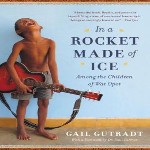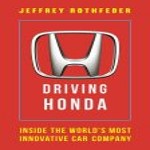| SEPT
2014
AUDIO BOOK REVIEWS
by Jonathan Lowe
 |
IN
A ROCKET MADE OF ICE by Gail Gutradt is non-fiction
about the HIV children of Wat Opot, in rural Cambodia.
It’s a community started by a former Vietnam
medic that is discovered by the author, whose life
was transformed by the encounter with stigmatized
children who deserve to grow up in a place like this,
without judgment, (and instead with love.) This is
the kind of book the world needs to hear now, in addition
to war chronicles detailing battles (often, as in
Africa, with children bearing the automatic weapons.)
While nations wave their flags and rattle their sabers,
it’s the children who can remind us that we
are all universally innocent before we start playing
our violent ego games. Narrator Lorna Raver
is marvelous, being an experienced stage and film
actress with a gift for empathic involvement with
character. About this audiobook, she told me, “While
the author protests that she is not primarily a writer
or a journalist, I thought she did a lovely, obviously
heartfelt, job telling the story of Wat Opot. My admiration
goes out to Wayne Matthysse and Gail Gutradt!”
And this from Wayne at the Wat Opot community: "Gail
brought our everyday life into stories people want
to read about. Her honesty and openness about her
experience here is impressive. Although Wat Opot today
is not the same place she writes about, the disease
still rears it's ugly head occasionally in one of
our small children and we are reminded of those days."
|
|
|
Also
check out THE MILL RIVER REDEMPTION by Darcie
Chan, about a widow who starts over in a
small town in Vermont with her young daughters. who
later become estranged and move away. After their
mother’s death, they are then brought back to
the town to hunt for a hidden key to a safe deposit
box left by their mother with their inheritance inside.
(Kinda like various clues to hidden money that made
news recently.) Amy Rubinate narrates
with a subtle and poignant grace, and told me this
about the novel and the previous The Mill River Recluse:
“I thought both books were beautifully written,
with a kind of timeless grace. I like to imagine several
generations all enjoying them together; they're books
my mom and grandmother and I would have shared. Hope
you love them as much as I do! This is the kind of
series where you might want to read both books. The
first book adds a lot of depth and history to the
second one.” |
|
 |
Next,
after hearing Ronald Kessler’s audiobook
FIRST FAMILY DETAIL, you have to wonder if
they shouldn’t call it The WHITEWASH House.
Kessler updates information previously covered in
“In the President’s Secret Service”
and “Inside the White House”
with new revelations. The information comes from present
and former Secret Service agents, some of whom were
told not to cooperate with the journalist when it
was learned he was writing this book. Was Richard
Nixon a sociopath? All the traits were there: charming,
ruthless, opportunistic, and dismissive of critics
and dying soldiers. Johnson was even more of a klutz
than Ford (who was cheap and a bad tipper, while pocketing
mini bottles from parties.) Clinton had multiple mistresses,
and was always on the prowl. Hillary? She always knew,
didn’t care, and didn’t want to hear more
and have to face questions. Clinton’s presidency
was called by agents “one long pizza party,”
in which anyone would show up at any time to throw
ideas around, regardless of how it inconvenienced
agent planning. (Note that this book is seen mainly
from the agents point of view.) Reagan, Bush 41 and
George W, (and their wives) were loved by agents for
being on time and respectful, while the Clintons were
never on time and dismissive. Jenna Bush (codenamed
“Twinkle”), though, despised being watched
by agents, and snuck out whenever she wanted with
her sister. Still, vice presidents and their relationships
with agents is even more interesting. Joe Biden is
described as wasting taxpayer funds by delaying trips
in jets and helicopters, while “putting America
at risk” by not giving the Service sufficient
notice of his plans (or not having national security
information nearby.) Al Gore was disliked by agents
too, because he “farted in the limo, and didn’t
care.” Agnew was a moral majority icon without
morals or ethics himself, willing to take bribes and
denigrate those opposing Vietnam as “unAmerican.”
Dick Cheney was more of an enigma, but was liked by
agents “since he was professional and businesslike.”
(Perhaps like at Halliburton?) Regarding Romney’s
clash with agents over his protection, and Obama himself,
there’s not much until the last hour. And you’ll
have to hear that for yourself. All in all, another
interesting book with lots in information about how
the Secret Service operates (with its failures and
own inefficiencies added in passing.) Bear in mind
that this book doesn’t care much about Presidential
policies or the effects of these policies on our current
or future situation. I’ve interviewed Kessler
about his book “The Season,” about the
billionaires of Palm Beach, but narrator Michael
Bybee is unknown to me. He was trained by
Pat Fraley and Bob Bergen, however, and is completely
listenable and on top of steering the narrative without
falling away from interest or engagement. |
|
 |
Finally,
DRIVING HONDA by Jeffrey Rothfeder
may, at first hearing, seem to be a long winded advertisement
for Honda Motors. After all, there is a long list of
accomplishments made, including how Honda has become
the most profitable car company, making the most number
of engines in the world…which in turn last longer
on the road than any other manufacturer, while meeting
stringent air quality and gas mileage standards. But
then comes the philosophy of Soichiro Honda himself,
an enigmatic but perceptive man who embraced paradox,
hands-on knowledge, and individualism. How did he achieve
what he did? The managerial style of Honda is the answer.
The audiobook, narrated by veteran voiceover
artist Mel Foster, lays out a unique path taken
by Honda from the beginning. Unlike American car companies,
and even other Japanese companies like Toyota, Honda
sought to decentralize their operations, using localization
strategy. They chose a tiny town in Alabama for their
first factory here, shunning MBAs and media types for
their leaders, and focusing on engineers. They encourage
debate and experimentation. And they spend more on research
and development than any other car company. Hence, the
subtitle of this audiobook: “Inside the World’s
Most innovative Car Company.” Rothfeder has done
his research in investigating the histories and work
ethics of those behind “The Honda Way,”
and concludes with an examination of free trade, tariffs,
and globalization. Business leaders would be well advised
to listen to this, as it shows how and why finding the
cheapest workers for one’s company by going overseas
doesn’t always work (as many who did so in China
are now leaving as China’s wages rise), and that
Honda’s strategy of becoming integrated within
the culture of whatever they are, while not imposing
control from an ivory tower halfway around the world,
is the most innovative and flexible of survival techniques.
“Success can be achieved only through repeated
failure and introspection. In fact, success represents
one percent of your work, which results only from the
ninety-nine percent that is called failure.” Sounds
like something Michael Jordan might have said, but this
is Soichiro Honda speaking, the Michael Jordan of the
manufacturing world…an area far more important
to world economies and standards of living than is basketball. |
|
|
For
free sample downloads of Jonathan’s novels,
Click
here.
Jonathan”s latest is TRANSCENDENCE
2: The Nexus Ultimatum, an SF novella available at
Amazon
and Audible.) |
|